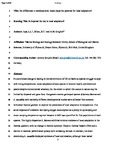Do differences in developmental mode shape the potential for local adaptation?
| dc.contributor.author | Jupe, L | |
| dc.contributor.author | Bilton, David | |
| dc.contributor.author | Knights, Antony | |
| dc.date.accessioned | 2019-11-05T12:27:47Z | |
| dc.date.issued | 2020-03 | |
| dc.identifier.issn | 0012-9658 | |
| dc.identifier.issn | 1939-9170 | |
| dc.identifier.uri | http://hdl.handle.net/10026.1/15116 | |
| dc.description | No embargo required | |
| dc.description.abstract |
Future climate change is leading to the redistribution of life on Earth as species struggle to cope with rising temperatures. Local adaptation allows species to become locally optimised and persist despite environmental selection, but the extent to which this occurs in nature may be limited by dispersal and gene flow. Congeneric marine gastropod species (Littorina littorea and L. saxatilis) with markedly different developmental modes were collected from across a latitudinal thermal gradient to explore the prevalence of local adaptation to temperature. The acute response of metabolic rate (using oxygen consumption as a proxy) to up-ramping and down-ramping temperature regimes between 6-36ºC was quantified for five populations of each species. The highly dispersive L. littorea exhibited minimal evidence of local adaptation to the thermal gradient, with no change in thermal optimum (Topt) or thermal breadth (Tbr) and a decline in maximal performance (μmax) with increasing latitude. In contrast, the direct developing L. saxatilis displayed evidence of local optimisation, although these varied idiosyncratically with latitude, suggesting a suite of selective pressures may be involved in shaping thermal physiology in this relatively sedentary species. Our results show that the biogeography of thermal traits can differ significantly between related species, and show that inter-population differences in thermal performance do not necessarily follow simple patterns which may be predicted based on latitudinal changes in environmental temperatures. Further research is clearly required to better understand the mechanisms that can lead to the emergence of local adaptation in marine systems and allow improved predictions of species redistribution in response to climate change. | |
| dc.format.extent | e02942- | |
| dc.format.medium | Print-Electronic | |
| dc.language | en | |
| dc.language.iso | en | |
| dc.publisher | Ecological Society of America | |
| dc.subject | thermal tolerance | |
| dc.subject | metabolic rate | |
| dc.subject | gene flow | |
| dc.subject | divergent natural selection | |
| dc.subject | adaptive differentiation | |
| dc.subject | marine invertebrate | |
| dc.subject | species distribution | |
| dc.subject | climate change | |
| dc.title | Do differences in developmental mode shape the potential for local adaptation? | |
| dc.type | journal-article | |
| dc.type | Journal Article | |
| dc.type | Research Support, Non-U.S. Gov't | |
| plymouth.author-url | https://www.webofscience.com/api/gateway?GWVersion=2&SrcApp=PARTNER_APP&SrcAuth=LinksAMR&KeyUT=WOS:000506071400001&DestLinkType=FullRecord&DestApp=ALL_WOS&UsrCustomerID=11bb513d99f797142bcfeffcc58ea008 | |
| plymouth.issue | 3 | |
| plymouth.volume | 101 | |
| plymouth.publication-status | Published | |
| plymouth.journal | Ecology | |
| dc.identifier.doi | 10.1002/ecy.2942 | |
| plymouth.organisational-group | /Plymouth | |
| plymouth.organisational-group | /Plymouth/Faculty of Science and Engineering | |
| plymouth.organisational-group | /Plymouth/REF 2021 Researchers by UoA | |
| plymouth.organisational-group | /Plymouth/REF 2021 Researchers by UoA/UoA07 Earth Systems and Environmental Sciences | |
| plymouth.organisational-group | /Plymouth/Research Groups | |
| plymouth.organisational-group | /Plymouth/Research Groups/Marine Institute | |
| plymouth.organisational-group | /Plymouth/Users by role | |
| plymouth.organisational-group | /Plymouth/Users by role/Academics | |
| plymouth.organisational-group | /Plymouth/Users by role/Researchers in ResearchFish submission | |
| dc.publisher.place | United States | |
| dcterms.dateAccepted | 2019-11-04 | |
| dc.rights.embargodate | 2019-12-6 | |
| dc.identifier.eissn | 1939-9170 | |
| dc.rights.embargoperiod | Not known | |
| rioxxterms.versionofrecord | 10.1002/ecy.2942 | |
| rioxxterms.licenseref.uri | http://www.rioxx.net/licenses/all-rights-reserved | |
| rioxxterms.type | Journal Article/Review |


